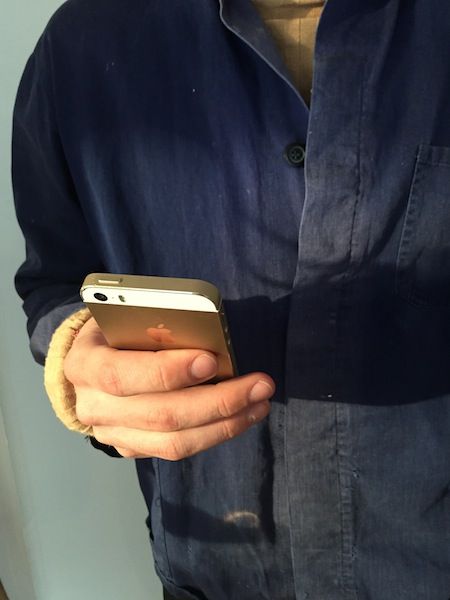

“Sex with strangers starts with a want to have sex,” a young man I’ll call Trey told me. “It comes from desire, boredom, a need for connection. It’s like a moment,” he continued. “You feel it in your gut, a sort of primal urge. Then you start shopping—Grindr, Scruff, Guydar. They are for gays only. Grindr knows no age, and they have all tribes. Then, on the app Tinder, you go through the photos, make rapid judgments and anticipate experiences, almost on an unconscious level. For older people there’s Match.com. There’s also OKCupid, which is more romantic and focused on relationships.”
Facial expressions and body language reveal a person’s psychology. The philosopher Emmanuel Levinas argued that the experience of another person’s face was the origin of identity. First, enabling the concept of the other, and then allowing for the concept of the self. As you are browsing the sites, how do you view the other? How do you know you’ve found someone you want to hookup with? What is that connection you feel, the impulse?
“Pictures that convey physical attractiveness trump bios,” Trey answered. “You scroll through the apps on your cellphone while in the subway, on the plane, in a taxi, at work, in a new city (called ‘visiting’), or at home. When you’re online, you’re doing your best to get a comprehensive image of what this person looks like, smells like, acts like, sounds like, and feels like. You study their pictures, bios, stats, and whatever else you can find. You get messages asking: ‘Horny?’ You see the name: ‘Hung,’ and you see the headline: ‘Be direct. Just looking for trouble. Grindr sucks. 420+.’ About: ‘Fun, mild to wild. Hung 9 uncut thick. Top/vers. Bottoms pls.’ His picture is of his lower abs, dusted with body hair, tan, the waist of his pants barely peaking through. No face.”
No face…that’s provocative; however, you miss the ability to read the facial expressions, which make it more difficult to achieve your objective of knowing if there is also empathetic arousal. What about meeting these would-be partners. I’m sure they don’t always work out. Is there ever apprehension, anxiety, or disillusionment?
“Every time. If someone doesn't have a picture of their face, I always ask that they send one. I can’t chat with abs, like you said; I need that empathetic arousal. When you chat with someone, you analyze the way they speak in text form. All the work done before the meet-up serves as an attempt to do whatever you can to not be surprised. You know when you look at a picture of a McDonald’s hamburger and then you get the real thing…well, that’s what I try to avoid.”
Researchers have found that something commonly happens when the person swiping profiles finds someone that meets their aesthetic preferences and search expectations. Dopamine, the “feel-good” chemical, is released as they "like" them. Mirror neurons create feelings of empathy toward certain individuals; we identify with subtle body language and feel that we understand something important about them. Our brains have evolved over millennia toward this extraordinary social capacity: to discern and take pleasure in the attractive features of others. This capacity evolved as a tool for survival. What emotional response do you take from pictures that appeal to you? What meaning do you give it? What thoughts and action come next?
“There is more titillation and fantasy building as you stalk the Internet for their virtual presence, crafting and imagining the person: smelling them, tasting them, feeling them, even hearing their voice. All the apps on your phone can be connected. You can link your social media accounts (Facebook, Twitter, Instagram) to your dating apps. But in the gay community, Grindr is well-known for finding sexual partners. You don’t see many profiles with social media accounts attached like you do on Tinder, Hinge, and OKCupid. But these days all forms of communication have an app, and sex is a type of communication. Sex is a culture.
Then there is the reality: you meet them. There is often little resemblance to the individual in your mind and the human before you. Most of the time, they don’t live up to your creative interpretation; however, sometimes, you meet someone, and they surpass your expectations. You love their smell. You rub their hair and secretly smell your hand afterward. This connection becomes attraction… It’s like swiping ‘like,’ but you do it in the real world.”
In the “real world,” humans rely heavily on the sense of smell for communication. Like other animals, human pheromones communicate more than reproductive sexual information intended for mate selection; we can also identify individuals and even determine their social rank from pheromones. Does the idea of social rank or dominance apply here?
“There are two distinctly different desires we’re talking about: the desire for companionship and the desire for sex. In my experience, anonymous sex—especially anonymous sex between two men—is about power. Who will dominate? Who will submit? I’m not always conscious of how smell comes into play here. I know there are times when a smell can bring me back to a previous sexual partner, but usually the experience was either really good or really bad—ecstasy versus trauma. I think, you notice the smell of a person when you develop feelings for them. You start attending to more subtle aspects of identity like smell in a romantic relationship. For example, my roommate says she always knows when there is something wrong with her boyfriend because she can smell it on him. If he’s up to no good, she can smell his fear.”
Odor preferences do and should play a role in partner preference. However, with the emergent complexities of today’s technological, social, sexual, and emotional interactions, we need a real fresh look at sexual behavior.
It is important to meet new people, and when you do, pheromones are subliminally exchanged. They are relayed by the terminal nerve (or cranial nerve zero), which emerges from the base of the brain and has endings in the nose. This is the olfactory nerve, which may also connect smell to sex. Scientists currently hypothesize that pheromones evade conscious awareness in the cerebral cortex via some bypassing circuitry; thus, indicating that your biology signals your mate.
Pheromone parties, where people smell the T-shirts of attendees and identify the ones that attract them based on scent, have started popping up. The sense of smell is missing from online dating as an important way of identifying suitable partners. Do you think there is a chance that your romantic feelings developed as a response to an unconscious chemical connection?
“It's hard to say, but I wouldn’t doubt it.”
Instead of hunting calories as humans historically had to do, would you say that a sizable portion of the population is now hunting sexual pleasure because of technology, and that it's the primary driving force evolving sex behavior?
“Absolutely. The app might tell you a guy sits 25 feet away and ‘looking for right now,’ which usually means looking for sex. They know you’re looking, and you know they’re looking. You get a message, ‘Hey.’ Many pictures of a fit oiled body arrive. You feel eager. What a freaking piece. Where are you? Can you come over now? Your doorbell rings. You open the door… and he doesn’t look like his picture… he’s not tall. Do you really care? Then, there are those certain physical features that you recognize from the pictures…you cling to them. So, ‘Hey, what’s up?’ And he says, ‘Hey, how’s it going good-looking?”
What’s next? I ask.
“You are forced to make a decision. You have to decide whether or not you care. I actually think this is one of the most unnatural things about apps like Grindr. You are forced to make an instantaneous decision whether or not to have sex with this person who stands at your front door. There is a little trauma and a little guilt because more times than not you decide you don’t care. Then, afterward, you realize you do.”
There are a lot of people in the world trying to figure out the secret formula to match strangers that would be attracted to each other. According to scientists, there are a host of environmental factors that come into play when it comes to selecting a mate. However, Instant Chemistry boasts about using DNA markers to test for romantic and biological compatibility. Saliva samples are tested for genetic markers. What app do you think works best for encouraging and developing lasting positive relationships?
“An app like Hinge, which pairs you up with people based on mutual friends. It seems to mimic the real life courting rituals we had before online dating came along. Hinge has social accountability, which really makes a difference. In the past, people used to invite each other to parties, bars, dinner, and then those people would bring their people to create these big gatherings of mutual friends. These pockets of friends and mutual friends allow for a freedom to explore socially. You have the security of a network connected by similar standards of social behavior. You start to mingle, make connections, and establish a level of comfort that cannot be achieved otherwise. This social accountability is what matters when an individual decides to be vulnerable, available and open to romantic potential. Hinge’s ability to mimic that makes it invaluable as a online dating resource.”
Where does that put apps like Grindr?
“I mean, this is also why Grindr works…but in reverse. When men sign up, log in, whatever, they sign a contract, and enter a bubble of anonymity. It is well known that anonymity awakens the freedom to explore our deepest primal selves, and we have to explore these sides. I think most psychologists would agree with that. You can explore it in a relationship, but sometimes, in my opinion, you need to explore it in the safety of someone’s bed whose name you forgot.”
In her recent book, The Village Effect, Susan Pinker points out that strong bonds prolong our lives, saying, “those of us who invest in meaningful personal relationships with lots of real social contact are more robust and have better physiological defenses than those who are solitary, or who engage with the world largely online.”
By looking at sexual practices through the lens of geosocial sexual networking apps, it’s clearly important for us to find ways to be in each other’s physical presence. We find pleasure, on many levels, when we connect in a thoughtful way. Online dating has created unique opportunities; however, moving from sex trolling apps to accountability-based network apps might strengthen a person’s life bonds. The more these apps mirror our real-life, a "six degrees of separation" reality, and our acutely evolved biological abilities, the better, because you are not having sex with a stranger if your roommate knows him.
© 2015 Gayil Nalls
Gayil Nalls, Ph.D., is the author of The Sensuous Immortal featured in the book, Rendezvous with the Sensuous: Readings on Aesthetics. She's a contibuting writer for Nautilus magazine.
Find her at www.gayilnalls.com, @olfacticinkblot and @themassinglab



